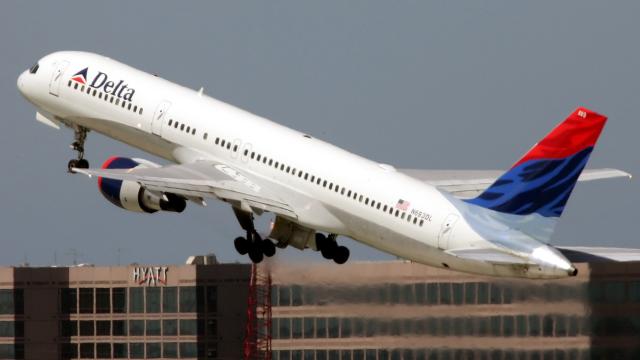Last year, Delta Air Lines cancelled fewer flights than any other airline, scratching just 0.3 per cent of its flights. That’s more than five times better than the industry average. It’s an obsession for Delta, an airline that once ranked near rock-bottom for cancellations, and as The Wall Street Journal explains, the company strives for zero-cancellation days in some very unorthodox ways.
After hitting the skids financially, and merging with Northwest Airlines in 2008, Delta chiefs were searching for a way to revive the airline’s tarnished image and poor performance. A 2010 passenger survey pointed out a pretty obvious, but none-too-simple goal: flyers will take a delay over a cancellation any day. So Delta’s vice president of operations control, Dave Holtz, threw down an ultimatum: “If that’s what customers hate most, let’s not cancel any more flights.”
Keeping the fleet in flying condition is a logical part of the equation, and Delta bolstered crews to deal with infrequent but flight-grounding malfunctions as swiftly as possible. For instance, the airline spent $US2 million supplying Boeing 767 engine starters to every airport that supports the plane, and invented a vibration monitor that tells mechanics to replace wobbling instrument cooling fans before they conk out.
Delta also uses some unusual flight rerouting to prevent cancellations. WSJ explains how just last week, the airline directed a Nigeria-to-Atlanta flight to make a pit stop in Puerto Rico, swapping in two fresh pilots to avoid cancelling the trip because the original pilots had hit their 28-day flight limit. Despite the diversion, the flight arrived in Atlanta only 40 minutes late. The pit stop manoeuvre is a new favourite of Delta’s, especially on international flights where a cancellation would be a major pain for passengers.
And then there are the seemingly goofball changes. In Delta’s operations center in Atlanta, maintenance managers and customer departments had their desks moved side-by-side, to make cooperation (and eavesdropping) easier. Now, if the mechanical crew discovers a plane won’t be ready for a flight, the team that handles hotel reservations for stranded passengers gets the news at the same time. Low-tech, but effective.
The unconventional practices are paying off: Delta had 72 days in 2013 where not one of its 2,500 flights was canceled. True, the crazy storms that opened 2014 hit Delta just as hard as every other airline, but the company has still posted more zero-cancellation days this year than the same period in 2013.
The astounding thing is, while these all sound like pretty logical practices, they’re seemingly revolutionary in the slow-to-change business of air travel. Go figure, when a company spends money making service better for its customers, that service actually improves. [WSJ]
Update: Gizmodo reader bigPixel shared another creative wayDelta reduced passenger complaints. When late-night arrivals at Salt Lake City complained about the wait for baggage, Delta responded by directing nighttime arrivals to the furthest gate. Baggage processing time stayed the same, but passengers spent more time walking and less time twiddling their thumbs at the conveyor, and bigPixel says complaints nearly disappeared. SLC isn’t the only airport to try the technique — this NYTimes piece from 2012 tells of the same tactic being used in Houston. Thanks bigPixel!
Picture: AP
